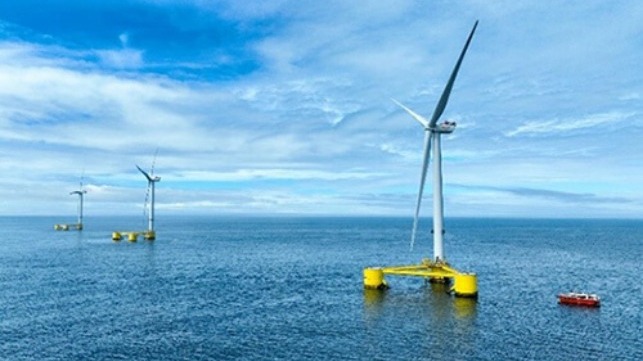Tokyo Gas Invests in Portuguese Floating Wind Farm to Develop Expertise

Japan’s Tokyo Gas, the primary provider of natural gas to the main cities in the country, is expanding its investment in the floating offshore wind sector as it looks to develop expertise as Japan’s offshore wind power industry begins to develop. Tokyo Gas has been an investor in Principle Power, a U.S. developer of floating foundations, and now the Japanese company will buy a stake in Portugal’s WindFloat Atlantic, the first floating semi-submerged offshore wind farm.
Under the terms of the agreement, Tokyo Gas reports it will acquire a 21.2 percent stake in WindFloat Atlantic, from Ocean Winds, a joint venture between Portuguese utility EDP and France’s Engie. Ocean Wind is also an investor in Principle Power alongside Tokyo Gas.
WindFloat Atlantic is located about 12 miles off the northern Portuguese Coast in the Atlantic and has been operating since 2020. It has three units each with a capacity of 8.4 MW or a total output of 25 MW. The project was developed over 10 years and is designed to demonstrate the potential for floating offshore wind turbines. It uses Principle Power’s floating foundation system WindFloat which Tokyo Gas highlights is structurally stable in conditions up to 65-foot waves and wind speeds over 86 mph.
Tokyo Gas highlights it is the company’s first participation in an overseas floating offshore wind power generation project. Terms of the investment were not announced.
“We will utilize the knowledge and experience gained from this project to work towards the large-scale commercialization of floating offshore wind power in Japan,” said Kentaro Kimoto, Executive Vice President and Head of GX Company, Tokyo Gas. Through its participation in this project, Tokyo Gas aims to accumulate experience in operating floating offshore wind power generation, particularly in acquiring advanced O&M methods that make full use of digital and next-generation technologies.
The company highlights that there are high expectations for the expansion of floating offshore wind power generation in offshore areas of Japan with favorable wind conditions. Japan’s topography however has few areas for the traditional fixed bottom wind turbines. Most of the coastal areas are deep ocean.

that matters most
Get the latest maritime news delivered to your inbox daily.
Ocean Winds which was launched in 2019 has goals to have 5 to 7 GW of offshore wind power in operation or under construction by 2025. It is also targeting a further 5 to 10 GW in the development stage.
The Japanese government has set a target of 10 GW of offshore wind capacity by 2030 using a combination of fixed bottom and floating turbines. In the following decade, it looks to rapidly grow offshore energy generation to 45 GW by 2040.
